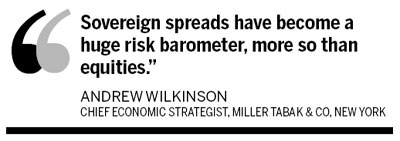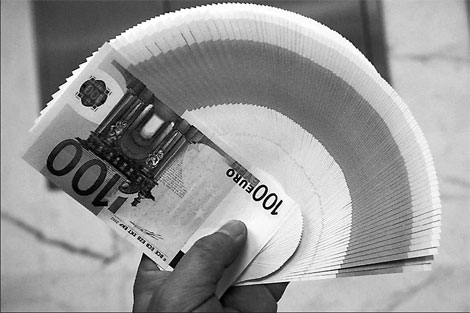Seeking safety in the dollar
Updated: 2011-11-21 07:56
By Allison Bennett (China Daily)
|
|||||||||
|
The euro slid 2 percent to 104 yen in its biggest weekly decline since Sept 23. It dropped for a third consecutive week against the dollar, losing 1.6 percent to $1.3525. Provided to China Daily |
Confidence in eurozone to deal with debt crisis falls amid fears of more bailouts
NEW YORK - The euro had its biggest loss against the yen since September as European borrowing costs at almost euro-era records sapped confidence the region's governments will be able to deal with their debt crisis.
The 17-nation currency rose for the week against the New Zealand and South African currencies amid reports talks may start on the European Central Bank lending to the International Monetary Fund for sovereign bailouts. The US dollar gained against all of its 16 most-traded peers but the yen as investors sought safety, sending stocks and commodities lower as a Nov 23 deadline loomed for Congress' deficit-reduction supercommittee.
"Sovereign spreads have become a huge risk barometer, more so than equities," Andrew Wilkinson, chief economic strategist at Miller Tabak & Co in New York, said on Friday. "You need to see a meaningful decline in Italian benchmark yields before the market and the euro can think about shrugging this off."
The euro slid 2 percent to 104 yen in its biggest weekly decline since Sept 23. It dropped for a third consecutive week versus the dollar, losing 1.6 percent to $1.3525. The greenback fell 0.4 percent to 76.91 yen and touched 76.58 on Friday, the weakest level since reaching a post-World War II low of 75.35 yen on Oct 31.
The European currency pared losses for the week as Italian government bond yields fell below 7 percent, the threshold at which Greece, Ireland and Portugal sought bailouts, after the ECB purchased the debt. Ten-year yields declined on Friday to 6.64 percent.
The extra yield investors demand to lend to Italy rather than Germany for 10 years was 5.29 percentage points on Nov 15, after reaching a euro-era record of 5.53 percentage points on Nov 9 on concern Europe's debt crisis would spread. The gap narrowed to 4.67 percentage points.
The ECB bought larger-than-usual quantities of Italian debt on Nov 16 and 17 and Friday, according to people with knowledge of the trades. They declined to be identified as the deals are private. Several also said the bank purchased Spanish bonds. An ECB spokesman declined to comment.
"There is very much the story of the broadening of contagion to the core," said Alan Ruskin, global head of Group-of-10 foreign-exchange strategy at Deutsche Bank AG in New York on Nov 16. "We're still in a market where any kind of longer-term player is much more comfortable selling on the euro upside than buying the downside."
The euro slid 1.2 percent over the past six months versus nine developed-nation peers tracked by Bloomberg Correlation-Weighted Currency Indexes as European leaders struggled to contain the sovereign debt crisis. The yen gained 9.7 percent and the dollar rose 4.3 percent.
New Zealand's dollar, nicknamed the kiwi, and South Africa's rand were the biggest losers against the euro among its major counterparts as the European turmoil sapped risk demand. The kiwi tumbled 3.7 percent to 75.65 US cents, and the rand dropped 3.2 percent to 8.1975 a dollar.
The Standard & Poor's 500 Index retreated 3.8 percent, and the S&P GSCI Index of raw materials dropped 2.6 percent.
The franc fell versus the dollar and euro, sinking 1.9 percent to 91.66 centimes to the greenback and slipping 0.2 percent to 1.2398 a euro. It has depreciated 10 percent against the euro and 14 percent against the dollar since Sept 5, the day before the Swiss National Bank imposed a ceiling at 1.20 a euro to stem franc gains, which were hurting exporters.
"The Swiss National Bank just has more credibility, because they've said they'll do whatever it takes, and the market really believes them," said Eric Viloria, senior currency strategist at Gain Capital Group LLC in New York.
IntercontinentalExchange Inc's Dollar Index, used to track the greenback against the currencies of six major US trading partners including the euro and yen, rose 1.5 percent to 78.023.
The United States 10-year notes gained last week as investors sought refuge, pushing the yield on the benchmark security down five basis points, or 0.05 of a percentage point, to 2.01 percent.
Members of the congressional supercommittee are seeking a path forward on stalled deficit-reduction talks as this week's deadline draws near. There was little sign Republicans are budging on their anti-tax stance or that Democrats will agree to major changes to entitlement programs.
If the deadlock continues past the deadline, at least $1.2 trillion in automatic spending cuts would take effect in 2013, split between defense and domestic discretionary programs.
Bloomberg News

(China Daily 11/21/2011 page14)












